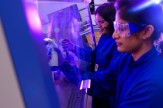University celebrates 50 years of educating future entrepreneurs
The year 2008 marked the 50th anniversary of entrepreneurship education at Northeastern. Over the half-century—highlighted by innovative partnerships, interdisciplinary programs and world-class faculty—generations of students have gained prominence as founders of businesses, venture capitalists and leaders of economic development and growth.
“Northeastern has done a superb job of teaching and creating programs and activities on entrepreneurship,” said John Friar, senior academic specialist of entrepreneurship and innovation. “Turn over a rock,” he said, “and you find a faculty member or a student doing something with entrepreneurship.”
The university’s long history of entrepreneurship education began in 1958 when the university teamed with the United States Small Business Administration (SBA) to create a 12-course certificate program for small business owners. From 1959 to 1976, Northeastern maintained the largest Small Business Institute in the country, convening evening classes, one-day seminars and a monthly speaker series for business owners and managers, which accumulated 160 members during its first three years.
In 1960, Northeastern created its first MBA course in entrepreneurship, “Financing a Startup,” and in 1966 teamed with the College of Pharmacy for a workshop on designing a retail pharmacy. Today, students can earn a master’s in applied nutrition with a specialization in entrepreneurship, as well as in informatics, nursing administration, music industry and engineering.
As an example of the university’s cross-disciplinary approach to entrepreneurial education, 400 music industry students, Friar said, take four courses on starting and managing a music business. In addition, the School of Technological Entrepreneurship (STE), created in 2004, is the nation’s first stand-alone school to provide real-world experience to aspiring entrepreneurs on how to create technology-based businesses, market science- and engineering-based products and obtain the financing necessary to fund growth. An MIT study found Northeastern students second to only MIT students in launching technological startups, Friar said.
“Northeastern has one of the oldest, biggest and broadest entrepreneurship programs in the country,” Friar said. “We are nationally known as a top-rated undergraduate program and for our large co-op program in entrepreneurship. When I speak about our programs at conferences, however, others are in disbelief that Northeastern is now in its 51st year of entrepreneurship. The majority of universities have developed programs only in the last 10 years.”
In 1968, the university put forth the first program for minority entrepreneurs, and
Harvey Krentzman became the first Northeastern professor to publish a textbook about the field. In 1973, the university created an undergraduate concentration in entrepreneurship and tenured its first professor, an unusual feat, especially since entrepreneurship did not become a legitimate academic pursuit until the mid-to-late ‘80s, Friar said. “It’s hard to get tenured faculty in entrepreneurship,” he said. “Most faculty members are adjuncts who come from industry. But we did it in 1973.”
In 1991, the university created the Family Business Center, one of the oldest and largest in the country dedicated to helping the generations within family businesses keep their businesses and families intact. In 1996, Northeastern established the Entrepreneurship Center to help students start their own companies. As a result of the center’s activities, the Princeton Review ranked Northeastern as the fourth most entrepreneurial campus in the country.
And, in 1996, the Social Entrepreneurship Center introduced students to the power of microlending in developing countries. Every year students travel to Africa or Central America to help local entrepreneurs.
Entrepreneurship Today
The Internet boom of the mid-’90s, Friar said, drove more students to consider entrepreneurship. A dramatic increase in scholarly journals and research, too, permeated the field.
“Everybody said the Internet was going to change the business model,” Friar said. “There was this new technology led by startup companies and there was tremendous student interest in it. Students began seeking out entrepreneurship courses.”
Whereas students today continue to demand an entrepreneurial education, the downtrodden economy craves an influx in job creation from small firms. During the 2001 recession, Friar said that while big companies shed jobs, substantial growth occurred in small business. “Countries with higher levels of entrepreneurship have higher levels of economic growth,” he said, adding that one-person firms operate 74 percent of all businesses in the United States.
In the past, massive government programs were used to increase the economic viability of particular countries. “Those didn’t work,” Friar said, so the policies have changed to support people to build their own businesses to promote “endogenous growth.”
But more research is needed on the correlation between entrepreneurship and economic and social development so that entrepreneurs can begin to solve problems related to poverty, drugs and, also, the environment.
“Entrepreneurship has been in ascendancy for a while,” Friar said. “People see it as a way to solve a bunch of problems: to get poor areas up to speed, to grow the economy. Countries such as India and China who have freed up entrepreneurs have seen their economies skyrocketing. Countries which kill entrepreneurship… see their economies stagnate.”
To develop a further understanding of entrepreneurship and the economy, Northeastern recently hired faculty with Ph.D.’s in the field as well as additional researchers for its Family Business Center. In addition, faculty and staff with STE are trying to build an interdisciplinary research program.
“We have to build a critical mass of researchers,” Friar said. “We are already known for our teaching, programs and co-op. Now we need to get known for our interdisciplinary research.”





